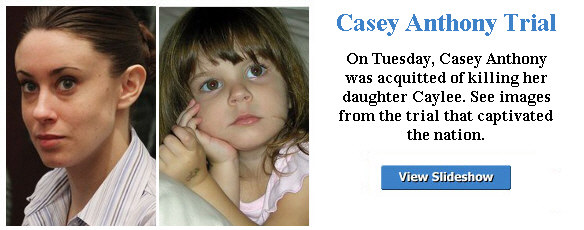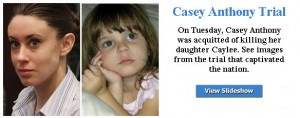Should Casey Anthony be allowed to keep a new baby or adopt one?

You may have heard something about the recent Casey Anthony jury trial. In June, 2008, Casey was 22 years old and had a 2-year-old daughter named Caylee. A month later, when confronted by her mother, Casey admitted that Caylee had been missing for 31 days and that she was taken by her babysitter. Casey explained that she was trying to find Caylee herself.
Casey’s mother notified the police and an investigation led to Casey’s arrest. She was charged with first-degree murder, manslaughter, child endangerment and lying to the police. Circumstantial evidence included Internet searches on the home computer for chloroform, Casey’s lifestyle before and after the child’s disappearance including a “beautiful life” tattoo that Casey got shortly after Caylee went missing and Facebook pictures of Casey partying during the same period. Caylee’s skeletal remains were found in the woods six months later in December, 2008, close to her grandparents’ home.
Physical evidence included duct tape found on Caylee’s mouth similar to the brand found in the grandparents’ home, and the smell of chloroform and decomposition in the trunk of Casey’s car. Casey told her parents that the child’s babysitter stole her because she didn’t think Casey was caring for her properly. This and other stories were proven to be lies. At trial in 2011, Casey’s lawyer told the jury that Caylee drowned in the grandparents’ pool and that her grandfather helped Casey cover up the accident by getting rid of the body. Following six weeks of trial, the jury found Casey not guilty of the more serious charges. They determined that she lied to the police during their investigation. She was granted “time served” and is scheduled for release from jail on July 17, 2011 after being held for almost three years.
Although many are outraged by the verdict, one must consider the burden placed on the state in order to obtain a conviction. In a criminal trial, the state carries the burden of proving all of the elements of the crime “beyond a reasonable doubt.” This is the highest standard in the legal system that must be met by the prosecution because of the penalties attached to conviction, including taking one’s liberty through incarceration. In this case, Casey was facing a possible death sentence if convicted of first-degree murder of her daughter. This leaves no room for a jury to be anything less than convinced beyond any reasonable doubt of the defendant’s guilt. The fact that the state was unable to show how Caylee died, when she died or a motive for her death contributed to the jury’s acquittal.
Casey is now 25 years old and has reportedly commented that she would like to have another child. As you know from posts on this website, Child Protective Services exists to protect children from abuse and neglect. In every state, CPS has the authority to remove children from their parents in order to protect them from harm. After reunification services are started, many children are returned to their families. Others, however, result in a termination of parental rights freeing the child to be adopted or placed in long-term care.
Termination of parental rights may be based on a number of factors: abandonment of the child, physical, sexual or emotional abuse, mental health of the parent, incarceration of the parent for a lengthy period of time, and chronic alcohol or drug abuse. There have been cases where the abuse suffered by one child justified removal and termination of rights of a sibling who had not been directly affected by the parent’s behavior. For example, a mother can lose custody of a newborn at birth when there’s a history of drug use resulting in the removal of older children.* When the mother fails to accept the services offered by the state to reunite with her children, and the newborn tests positive at birth for fetal alcohol syndrome, that baby will likely be placed in foster care. Termination and adoption may soon follow.
Every state has specific rules & laws about adopting a newborn, a teenager and even another adult. If Casey decides to adopt a child, should she be allowed to when considering the details of Caylee’s life and death? Anyone wanting to adopt must be approved by either a licensed adoption agency and/or a court. The bottom line when adopting is the “best interests of the child” not the adult who wants to adopt. A judge, in granting an adoption, must make a specific finding that granting the adoption is in the child’s best interests. Could a court make this determination in Casey’s favor? If unable to adopt in the United States, Casey may seek to adopt a child in another country under the laws of that country. She can legally bypass the laws in the United States.
So, the question now is whether Casey, although acquitted of the most serious charges, will be allowed to keep another baby if she becomes pregnant or adopts a child recognizing the unexplained death of Caylee. What do you think? Since Casey has been acquitted should she be allowed to get on with her life as if nothing has happened? Should all of the red flags raised in her trial be ignored? The trial and three year history of media coverage has inflamed observers and pundits critical of the verdict. What would be the responsibility of Child Protective Services if they became aware of another child in Casey’s care?
*Court cases where siblings have been removed from a parent by the state based on evidence of abuse of a different child:
Albright v. Arkansas Dept. of Human Services (termination of father’s rights over his three children upheld when he sexually abused his girlfriend’s child), 248 S.W.3d 498 (Arkansas 2007).
In re M.W. (mother allowed father to return home after sexually abusing one of the children – all six children were declared dependent wards of the state), 842 A.2d 425 (Pennsylvania 2004).
In re A.H. (discussion of anticipatory neglect and terminating a parent’s rights), 627 N.W.2d 33 (Michigan 2001).
In the Interest of J.B. (termination of biological father’s rights based on sexual abuse of stepchildren), 706 N.E.2d 497 (Illinois 1998).
In re Christina L. (termination of mother’s rights to unabused son based on the abuse of his sister), 460 S.E.2d 692 (West Virginia 1995).
We recognize that there are court decisions finding that such evidence is insufficient to either declare a child dependent or to terminate parental rights.




Casey Anthony was acquited. Of course she should be allowed to have another baby or adopt one.
It doesn’t matter, Casey is old news and the viewing public needs to move on.
No she shouldn’t, but legally there is no stopping her from doing so.
No. She should be in prison.
No comment on my part…quite frankly, I’m tired of hearing about Casey Anthony.